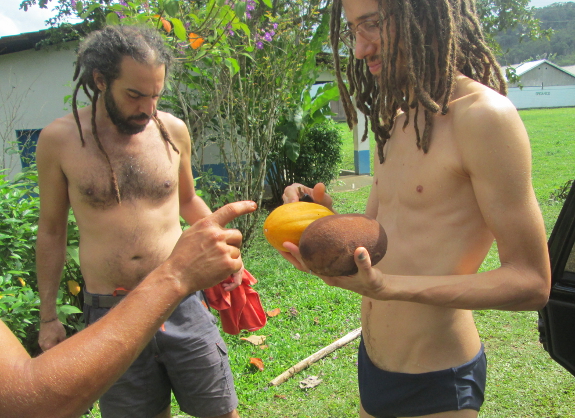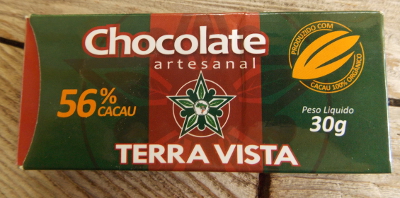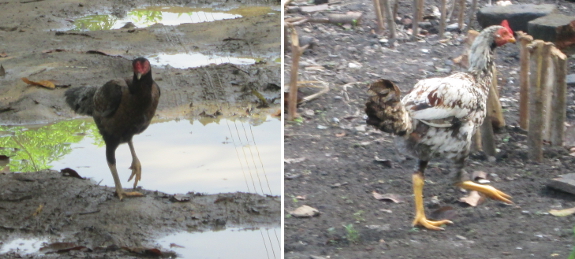
Brazilian chocolate and the Landless Movement

 Joey
went to Brazil and brought me back a chocolate bar...plus a fascinating
story about Terra Vista, an 800-acre sustainable chocolate farm in
Bahia. The photo above shows some of Joey's new Brazilian computer
buddies, one of whom is holding a cocao pod (the brown one) along with a
tropical fruit. The other photo is of my Brazilian chocolate bar,
which is interestingly hard --- perhaps much lower in fats than the
chocolate I'm used to? The ingredients list 50% cocoa, 6.6% cocoa butter, 36% sugar, 7% milk, and 0.4% soybean lectin.
Joey
went to Brazil and brought me back a chocolate bar...plus a fascinating
story about Terra Vista, an 800-acre sustainable chocolate farm in
Bahia. The photo above shows some of Joey's new Brazilian computer
buddies, one of whom is holding a cocao pod (the brown one) along with a
tropical fruit. The other photo is of my Brazilian chocolate bar,
which is interestingly hard --- perhaps much lower in fats than the
chocolate I'm used to? The ingredients list 50% cocoa, 6.6% cocoa butter, 36% sugar, 7% milk, and 0.4% soybean lectin.
 The
story that goes along with the bar is about the Brazilian Landless
Workers' Movement, an effort by the peasantry to regain control of
agricultural areas in Brazil. According to the Movement, 3% of the
Brazilian population owns 67% of the country's agricultural land.
A new constitution drafted in 1988 can be interpreted to give
Brazilians the right to occupy unused agricultural land, to return that
land to productivity, and then, eventually, to gain ownership of the
property. Using this method, 50 low-income families moved onto
what is now Terra Vista in the 1990s, planted crops, and began to farm
organically.
The
story that goes along with the bar is about the Brazilian Landless
Workers' Movement, an effort by the peasantry to regain control of
agricultural areas in Brazil. According to the Movement, 3% of the
Brazilian population owns 67% of the country's agricultural land.
A new constitution drafted in 1988 can be interpreted to give
Brazilians the right to occupy unused agricultural land, to return that
land to productivity, and then, eventually, to gain ownership of the
property. Using this method, 50 low-income families moved onto
what is now Terra Vista in the 1990s, planted crops, and began to farm
organically.
The story made me wonder --- what would life be like in the U.S. if we
had a similar law on the books? Would it be good, allowing lots of
young people who dream of farming but don't have the capital to move
back to the land? Or would it be bad, with wild areas currently
being protected by neglect instead clearcut and turned into
farmland? I'd be curious to hear your take in the comments
section.

On a less serious note,
Joey said that what caught his eye in Terra Vista was the free-range
chickens, all of which were skinnier than American birds. There
were so many chickens that it seemed that each person on the farm ate
one a day, mostly in the form of stew.
I would love to send you
to a website so you could learn more about Terra Vista, which Joey said
was full of raised beds and other techniques he was familiar with from
our own farm. But the whole point of Joey's trip was to connect
villages who don't have internet access, allowing them to trade data
using memory sticks carried by hand when people travel from place to
place. So you'll have to use your imagination about everything
Joey didn't happen to take photos of. I hope you enjoyed this
brief glimpse of sustainable Brazilian agriculture!
Want more in-depth information? Browse through our books.
Or explore more posts by date or by subject.
About us: Anna Hess and Mark Hamilton spent over a decade living self-sufficiently in the mountains of Virginia before moving north to start over from scratch in the foothills of Ohio. They've experimented with permaculture, no-till gardening, trailersteading, home-based microbusinesses and much more, writing about their adventures in both blogs and books.
Want to be notified when new comments are posted on this page? Click on the RSS button after you add a comment to subscribe to the comment feed, or simply check the box beside "email replies to me" while writing your comment.

We have that Law on the Books in the US....although it's not Socialism/Communitarianism as with Brasil. This is a very old law. I would say that soon we will have all that here too.
Here it's called Adverse Possession. It means you can occupy an abandoned or un-lived in property legally; each State has it's own limitations on the amount of years you must occupy until you can claim it as your own. In Kansas it's 15 but some States it is only seven. The Law is about using the land productively. Adverse means you must notify the owner that you have taken possession of the abandoned property but he has a choice to give you permission to stay or face the chance of loosing it to you.
Brasil is really spelled with an s not a z